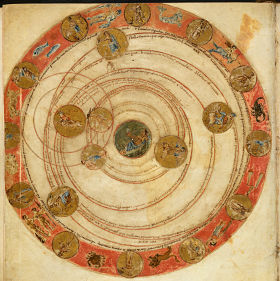252. Neverending Story: the Eternity of the World
Aquinas, Bonaventure, and the so-called “Latin Averroists” take up the question of whether the universe has always existed, and settle once and for all which comes first, the chicken or the egg.
Themes:
• C. Vollert, L.H. Kendzierski and P.M. Byrne (trans.), St Thomas Aquinas, Siger of Brabant, St Bonaventure: On the Eternity of the World (Milwaukee: 1984).
• B. Bonansea, “The Impossibility of Creation from Eternity According to St Bonaventure,” Proceedings of the American Catholic Philosophical Association 48 (1974), 121-35.
• R.C. Dales, Medieval Discussions of the Eternity of the World (Leiden: 1990).
• M. de Mowbray, “The De Aeternitate Mundi of Boethius of Dacia and the Paris Condemnation of 1277,” Recherches de Théologie et Philosophie 73 (2006), 201-56.
• P. Porro, “The Chicken and the Egg (suppositis fundamentis Philosophi): Henry of Ghent, Siger of Brabant and the Eternity of Species,” in L. Bianchi (ed.), Christian Readings of Aristotle from the Middle Ages to the Renaissance (Turnhout: 2011), 185-210.
• B.J. Shanley, “Eternity and Duration in Aquinas,” The Thomist 61 (1997), 525–48
• J.F. Wippel, “Did Thomas Aquinas Defend the Possibility of an Eternally Created World?” Journal of the History of Philosophy 19 (1981), 21-37.
• J.B.M. Wissink (ed.), The Eternity of the World in the Thought of Thomas Aquinas and his Contemporaries (Leiden: 1990).







Comments
Re: The Eternity Debate
As Peter rightly notes, the ancient debate around the eternity of the world/universe has, indeed, "fallen out of fashion" among the majority of contemporary philosophers; however, there are still some people who are producing work on this question. See, for example, this article, which points out that such arguments have recently undergone a revival of sorts among contemporary analytic philosophers of religion.
In reply to Re: The Eternity Debate by Tim
Eternity
Thanks - that link doesn't work for me though, maybe it is only me?
In reply to Eternity by Peter Adamson
Re: Eternity
My apologies concerning the link Peter, how about this one? I guess people outside the U.S. cannot follow a dx.doi.org link.
In reply to Re: Eternity by Tim
Link
Yes that works! Thanks.
14th century future?
Hello,
Have you posted your tentative schedule for the 14th century yet? If not, about when would you post it?
Also, is my memory correct that after Medieval/India, you're going to do Byzantine/African, then Renaissance/Chinese? It's definitely going to be interesting to see the New World coming into play, apart from what Kâtip Çelebi thinks about tobacco.
In reply to 14th century future? by Raphael
The future
I was actually thinking I would post the tentative 14th c. episode list soon - there are actually a few 13th c. episodes to come though, as we still have Henry of Ghent, Scotus, and the Romance of the Rose. Anyway it will go up on the blog and Facebook, don't worry.
As for further ahead you are exactly right, though I think Byzantine will be fairly short and so it will probably be more like Byzantine and Renaissance coincide with Africana philosophy. Chinese is more a dream than a concrete plan, for now at least.
In reply to The future by Peter Adamson
African philosophy?
I am not familiar with African philosophy and I am wondering what are the topics discussed by African philosophers and when did African philosophy develop? And I think that much of the north African philsophy have come to pass down as Latin, Islamic or French philosphy. Please exclude Egyption thought from this question.
In reply to African philosophy? by Yousef
African philosophy
Well, I think I will say "stay tuned" because after India I am going to do a whole series on African philosophy, and philosophy in the African diaspora, together with Chike Jeffers. The short answer though is that the earliest stuff apart from ancient Egypt (which we will include) is from Ethiopia, and then there is philosophy within Islamic culture and a big debate about philosophical ideas in oral cultures of Africa which may represent philosophical traditions that go back many generations... or not, depending on which scholar you believe. But as I say we will get into all this in great depth in future episodes, starting sometime in 2017 I guess.
Siger
Hi Peter, doesn't the name "Siger" rather correspond to the German word "Sieger" -- and hence should not be pronounced in the French way as you did -- but rather straightforwardly as it's written (i.e. as the German word mentioned above)?
I seem to remember Calvin Normore pronouncing "Siger" in the way I suggest, in a seminar at Princeton. What do you think?
Greetings,
Michael
In reply to Siger by Michael Gebauer
Siger
Oh, good point. I actually have heard it pronounced both ways by medievalists. You're probably right that since he is from Brabant a more Germanic pronounciation would be correct; on the other hand he was in Paris, so...
Aristotelian eternity of the universe
Hi Peter, you stated that Aristotle believed in the eternity of the universe, although Aquinas and some others were unsure about it. But Aristotle also believed in the existence of a First Mover (or so I am led to understand) as he essentially had only a static non-developmental, non-evolving, model of the universe. Thus if you do not believe that the universe contains its own motion of its own self-development then you must believe in a Prime Mover to start the whole thing off. But to me this is a contradiction of the type of order of argument that Aquinas and his medieval interlocutors are engaging in. If there is going to be a Prime Mover then there must be a particular first point in time when the Mover first moves the universe. Hence Aristotle has the same contradiction as the Medievals have with the eternity of the world and the notion of the Christian creator - there must be a particular point in time where He creates the universe. Was it this that Aquinas was picking up on when he suggests that Aristotle may have had some doubt as to the eternity of the universe? (BTW I have a second question here - I understand that the standard Latin for what is for us translated as the Prime Mover is something like the "Premium Mobile" - surely this has got a bit confused with a best selling line down at the Vodafone shop?!! ;-) )
In reply to Aristotelian eternity of the universe by Padmadipa
Prime mover
Yes, the objection you're raising there is one that was often made in anti-eternity polemics: if God creates, or moves, then there must be a first moment of creation of motion. The Aristotelian approach is rather to think of eternal motion as needing a cause: al-Ghazali, speaking on behalf of his Aristotelian opponent, compares this to a finger that is eternally stirring water; the finger is clearly the cause of the motion of the water even though there is no first moment of stirring. This is one reason the debate is so interesting: essentially the two sides are disagreeing about what causality needs to involve. For the anti-eternity people (and you, apparently) a cause must _begin_ to cause its effect at some point. For the Aristotelian, causal dependence can be a permanent state of affairs.
Add new comment